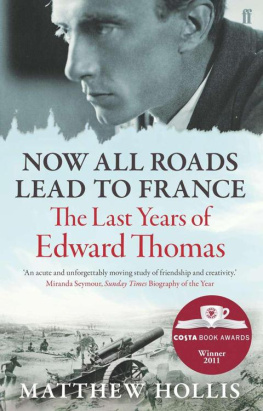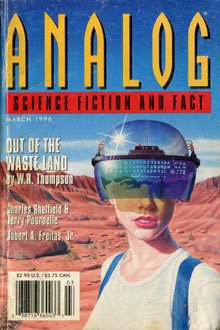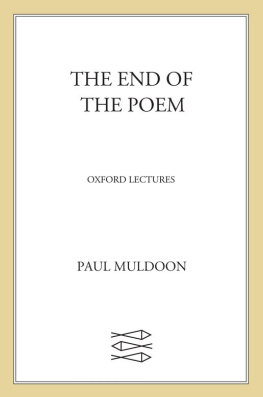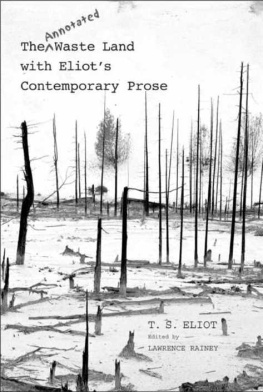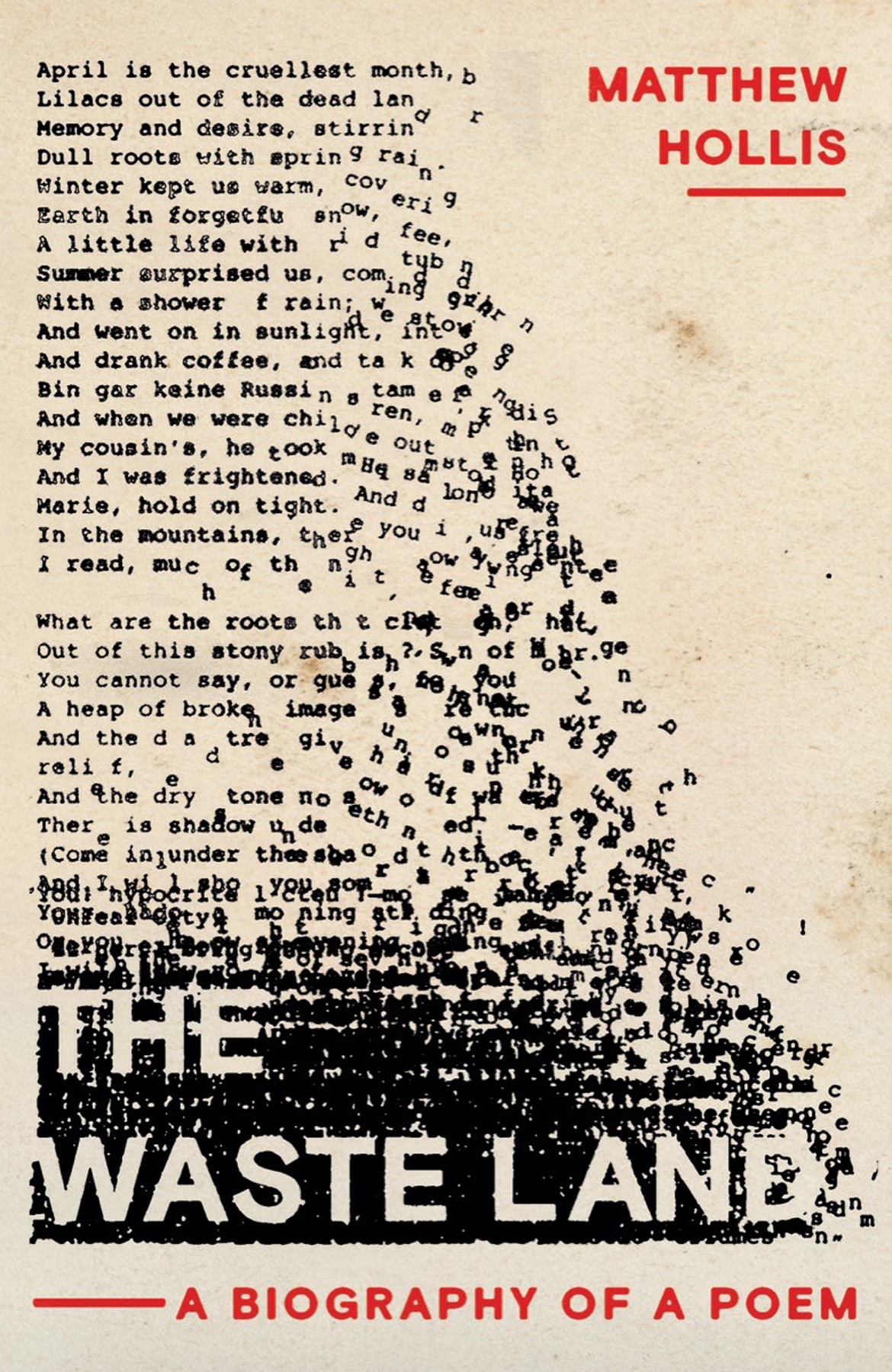Contents
Guide
Page List
by the same author
poetry
GROUND WATER
EAST
STONES
LEAVES
HAVENER
prose
NOW ALL ROADS LEAD TO FRANCE
The Last Years of Edward Thomas
as editor
STRONG WORDS
Modern Poets on Modern Poetry
(with W. N. Herbert)
101 POEMS AGAINST WAR
(with Paul Keegan)
EDWARD THOMAS
Selected Poems
THE WASTE LAND.
A Biography of a Poem
//
MATTHEW HOLLIS

Copyright 2022 by Matthew Hollis
First American Edition 2023
First published in the United Kingdom by Faber & Faber, Ltd. in 2022.
All rights reserved
For information about permission to reproduce selections from this book, write to Permissions, W. W. Norton & Company, Inc., 500 Fifth Avenue, New York, NY 10110
For information about special discounts for bulk purchases, please contact W. W. Norton Special Sales at specialsales@wwnorton.com or 800-233-4830
Library of Congress Cataloging-in-Publication Data is available
ISBN 978-0-393-24025-2
eISBN 978-0-393-65183-6
W. W. Norton & Company, Inc., 500 Fifth Avenue, New York, N.Y. 10110
www.wwnorton.com
W. W. Norton & Company Ltd., 15 Carlisle Street, London W1D 3BS
for Claire
There is always another one walking beside you
The Waste Land
I think of a friend who, in the early days, was as much concerned with the encouragement and improvement of the work of unknown writers in whom he discerned talent, as with his own creative work; who formulated, for a generation of poets, the principles of good writing most needful for their time; who tried to bring these writers together for their reciprocal benefit; who, in the face of many obstacles, saw that their writings were published; saw that they were reviewed somewhere by critics who could appreciate them; organized or supported little magazines in which their work could appear and incidentally, liked to give a good dinner to those who he thought could not afford it, and sometimes even supplied the more needy with articles of clothing out of his own meagre store. To him, several other authors, since famous, have owed a great deal.
T. S. ELIOT, 1949
Recollections? let some thesis-writer have the satisfaction of discovering whether it was in 1920 or 21 that I went from Excideuil to meet a rucksacked Eliot. Days of walking conversation? literary? le papier Fayard was then the burning topic. Who is there now for me to share a joke with? Am I too right about the poet Thomas Stearns Eliot? or my friend the Possum? Let him rest in peace. I can only repeat, but with the urgency of 50 years ago: READ HIM.
EZRA POUND, 1966
Contents.
by T. S. Eliot
Illustrations.
Plates
PAGE 1
Photograph Duane Garrett, 1977, Idaho State Historical Society
The Picture Art Collection / Alamy Stock Photo
Photograph Vivien Eliot. Reproduced by permission of the Estate of T. S. Eliot
PAGE 2
Photograph Vivien Eliot. Reproduced by permission of the Estate of T. S. Eliot
Photograph Vivien Eliot. Reproduced by permission of the Estate of T. S. Eliot
PAGE 3
GoodnessGracious.co.uk
Bettmann / Getty Images
PAGE 4
Reproduced by permission of the Estate of T. S. Eliot
Hamilton College Library Digital Collections. TUA 5th, will of Omar Pound
California Digital Library. Free Books Collection
PAGE 5
Courtesy of MargateLocalHistory.co.uk
Sainte-Luce Pension in Lausanne, postcard, c.1905 Muse Historique Lausanne
PAGES 67
Portrait by Sylvia Beach; Sylvia Beach Papers, C0108, Manuscripts Division, Department of Special Collections, Princeton University Library
(left: TSE) Photograph Vivien Eliot. Reproduced by permission of the Estate of T. S. Eliot; (right: VHE) Houghton Library, Harvard University
PAGE 8
Ezra Pound Library, LI-10962, Harry Ransom Center, The University of Texas at Austin
Reproduced by permission of the Estate of T. S. Eliot
In-text images
PAGES
Scans courtesy of the Berg Collection at the New York Public Library. Reproduced by permission of the Estate of T. S. Eliot and Houghton Mifflin Harcourt, an imprint of HarperCollins US. Pounds corrections, additions and marginal comments on The Waste Land, by Ezra Pound, from New Directions Pub. acting as agent, copyright 1971 by Ezra Pound. Reprinted by permission of New Directions Publishing Corp.
Morocco 1960.
Winters were becoming harder. Each year the chill reached deeper into his chest, each year the breathing tightened. Doctors urged for warmer climes, and in the biting cold of an English January he finally left London for Marrakesh. But the recuperation was not to go as planned. Two hundred miles to the south-west, the dogs of Agadir howled in unison and rats were driven up on to the streets; a column of fire shot into the sky. In capital letters he penned its title, and beneath it he wrote 1922, and beneath that he signed his name. His hand faltered as he recalled the epigraph, but for twenty-three pages it moved fluently. As it did, something remarkable took place: he recollected a line that had been culled from the drafts of the poem four decades before. Then, he had excised it at the insistence of his wife, Vivien, for whom it had been too painful a portrait of their troubled marriage. Now, he restored the words that once had been considered so hurtful. The ivory men make company between us. In writing out the poem, he had returned in mind to the company of those who once had worked alongside him. To Vivien, who had tuned his ear and lent a voice of her own, and who, through her marriage to Eliot, had accelerated the conditions that would bring the poem into being. And to the more forensic reader besides: one who had cleared the undergrowth of the poem in order to uncover its heart; one whose own life lay in tatters, and who looked to Eliot for his salvation. To him, Eliot inked the dedication for the last time: for Ezra Pound, he wrote, and, below it, il miglior fabbro. The better craftsman.
Ez Po and Possum
Have picked all the blossom,
Let all the others
Run back to their mothers
EZRA POUND, 1935
The runner was breathless when he finally caught up with the 157th US Infantry Brigade on the furthest reach of the Western Front. It was 10.44 in the morning and he carried with him the news that the ceasefire brokered overnight would begin at eleven oclock. Further runners were urgently dispatched to inform the other companies; but with no clear instruction on how to proceed in the sixteen minutes that remained, the Brigade Commander of the 157th took the decision that there would be no let-up in fighting until eleven. Private Henry Gunther was pinned with his company beneath a cover of fog on the rise of Ct-de-Romagne. The war had divided the loyalties of many of those fighting, but for Gunther it had been more divisive than most. A German-American from East Baltimore, his neighbourhood were people from the old country; when war broke out he found himself the subject of racial abuse. He cared more about his job in the National Bank of Baltimore, and about Olga, the girl he wanted to marry, than he did about the war, but he was drafted into the infantry regiment dubbed Baltimores Own for the Maryland men who served in it. A supply sergeant, he witnessed harrowing conditions at the front and wrote to a friend at home urging him to stay out of the conflict if he possibly could. An army censor reported his letter and Gunther was broken to the rank of private; his fiance ended their engagement, and with it the last of his morale. In the final minutes of the war, he lay face down on the ground occupied by his unit, bayonet fixed to his rifle, preparing to advance. Shells exploded in the boggy ground around him, sending up founts of iron and mud. On the slope above him, two squadrons of German machine-gunners counted down the minutes; they knew the armistice was imminent and could not believe their eyes when Gunthers company rose and began to approach through the fog. Had they not received the message of ceasefire? The Germans fired a round of warning shots overhead and the advancing troops dropped to find cover. Gunther alone rose to his feet and continued his advance. Perhaps he was driven to avenge his demotion, or perhaps to prove himself to Olga perhaps he had lost all sense of having anything left to salvage; whatever it was that urged him on, he ignored the call of his sergeant to stay down. A German gunner waved him back, but he would not turn, and was fired upon. Gunther was killed by a bullet to the temple. Sixty seconds later, the war to end all wars ended.


